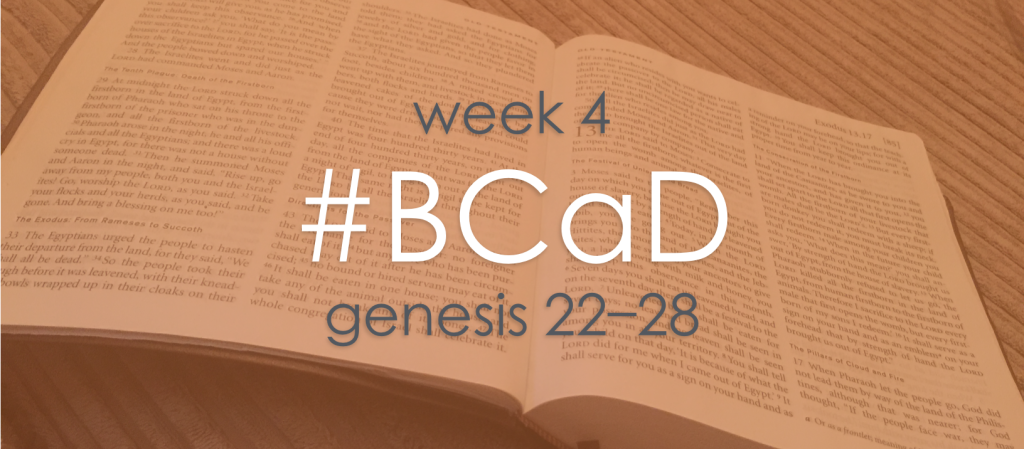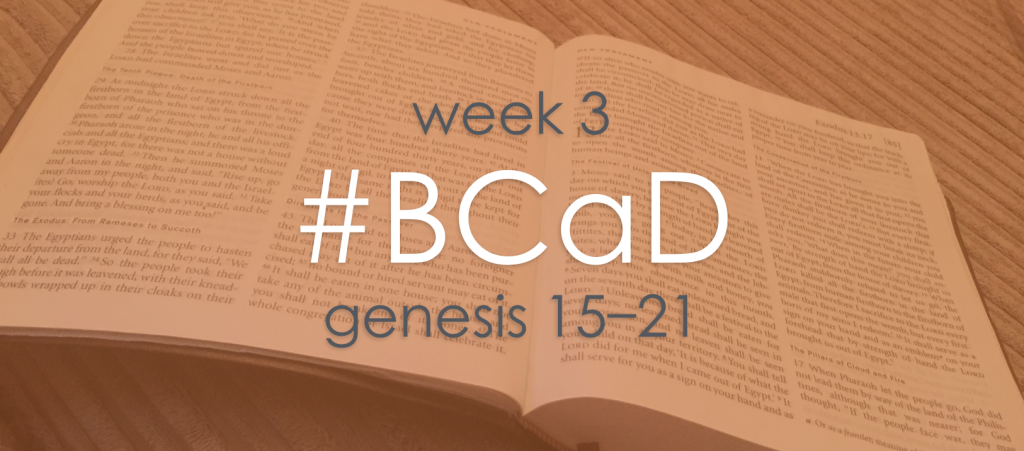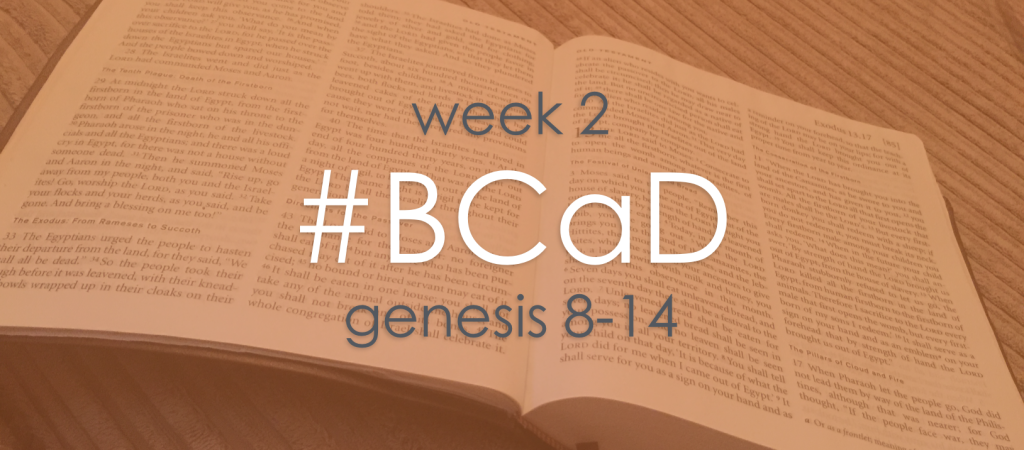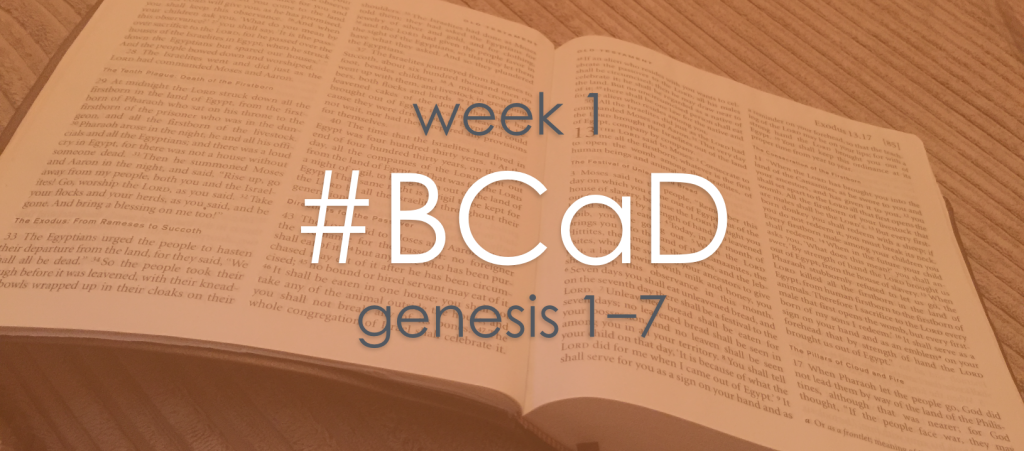
It’s now almost the end of the first month of my #BCaD challenge, and I’m still loving it. Here are my reflections on these remarkable chapters of the book of Genesis.
Genesis 22
Gen 22. The star of this story is God. He would do what Abraham only needed to be willing to do. He provides the Lamb.
— Dave Criddle
I remember preaching on this passage a couple of years ago and finding it hard. I find God’s instruction difficult, and I think that is ok. I find Abraham and Isaac’s faith amazing, that Abraham was so sure of God’s promise that he could believe even his son’s death could not stop the promise of offspring. What?! How?! I don’t know, and I don’t think he did either, but he went on in faith. What he knew was more important than what he saw. But more remarkable than that is this: what Abraham takes from this is that God’ provides. He provides the lamb. He was always going to, and He has now done so in full.
Genesis 23
Gen 23. Abraham now respectfully buying a plot of the land that is promised to be his anyway. Divine right does not equal human right.
— Dave Criddle
Abraham needs a cave to bury his wife. He has the divine right to this land, but he doesn’t demand it. Living in a world ruled by human forces means we submit instead of claiming some kind of entitlement that others do not have. He buys the land that God has already promised him for free. I see in this a picture of the way God’s people are always called to behave in the world. Christ has given us all things, but we don’t make demands, we lay it down.
Genesis 24
Gen 24. God goes ahead. The line must go on, so Isaac needs a wife. Not anyone will do, so God leads. He's still blessing this family
— Dave Criddle
Is this a story that tells us God has picked out the perfect person for each of us and we need to find out who that person is? No, I don’t believe it is. It’s a story that tells us the line of Abraham (the line of Christ) was so important that in these early stages God was willing to intervene and keep it on track. His hand is powerfully and uniquely over this family. Let’s choose not to read ourselves into these stories in ways that aren’t right. We learn from them. But we aren’t them.
Genesis 25
Gen 25. Abraham dies and his sons come together. And another generation begins, still with seeds of disunity. This line is very human!
— Dave Criddle
In death these two estranged brothers can come together. But in life they cannot live in unity. And even as the new generation comes, they too cannot live in unity together. God could not be looking on pleased with the behaviour of each generation of this family, but He doesn’t leave them. He is faithful to His promises, even when they are not. He is good, even when they are not. He is patient, even when they are impetuous. And that’s how he treats me too.
Genesis 26
Gen 26. Isaac's generation. The same sins, the same promises, the same blessings from God. This plan didn't stop with Abraham.
— Dave Criddle
It’s like pages from a few chapters ago are being repeated. The same place, a king with almost the same name, the same crime committed by Isaac as by Abraham and so many of the same results. And God acts with Isaac just as he had with Abraham. His blessing did not stop with Abraham’s death. His promise wasn’t to Abraham alone, but to all Abraham’s offspring, to the line that He had promised. So Isaac has the same capacity to bless and curse as Abraham.
Genesis 27
Gen 27. Lies, deceit, broken hopes. Yet the covenant of blessing and promise lives on. Constantly staggered by how human it all is!
— Dave Criddle
This story breaks my heart. A family that God has brought together, blessed and nurtured. But a family that is turned in on itself, divided, lying and stealing from one another. Two brothers pitted against each other even as their father lies on his deathbed. A wife picking favourites and dishonouring her dying husband. A father who has created some of this toxic culture by the way he has always favoured one son and left the other resentful. This is real stuff. But even oaths made for completely the wrong reasons are honoured by God. Jacob is now the heir, even though that is wrong.
Genesis 28
Gen 28. Jacob's dream of a ladder, this is a meeting place, where heaven and earth come close. A sign of the ultimate meeting place.
— Dave Criddle
The promise has been made so many times, but now it is reinforced. God reaching down to earth and us being able to reach up to Him. The land that Jacob is once again promised is to be a place where God and people meet, where heaven touches earth, where the distance between the human and the divine is bridged. A dwelling place for us and God. In John 1, Jesus uses this dream and applies it to Himself. He is the ladder who will be that bridge, on whom angels will ascend and descend. He brings us close to God and all that comes before – promises of offspring and land and blessing – is there to prepare us for the real deal.



